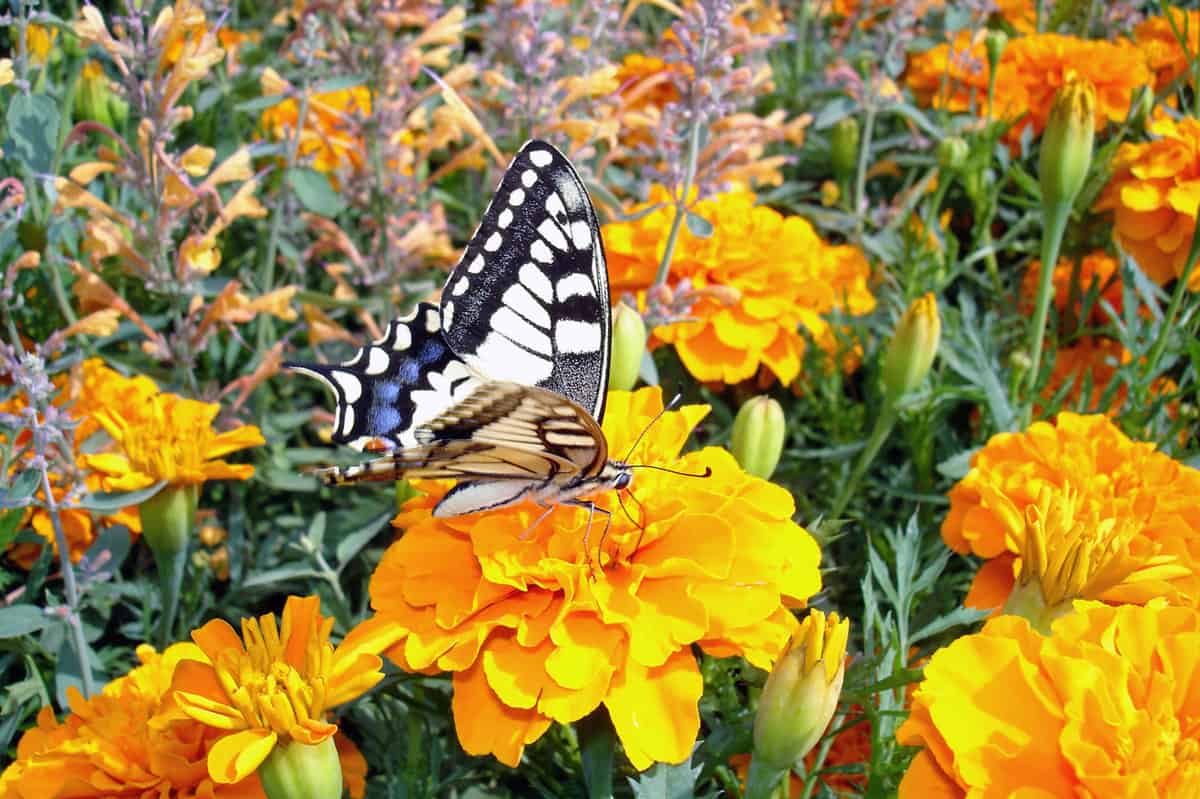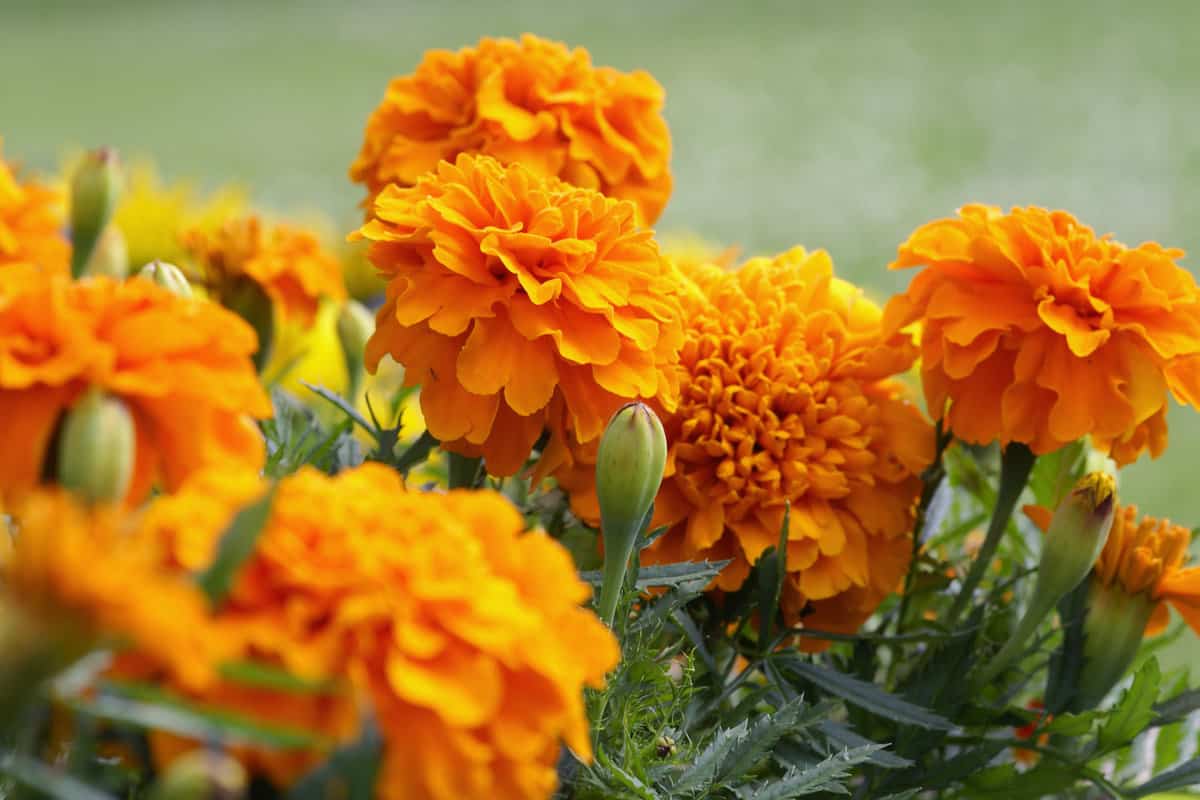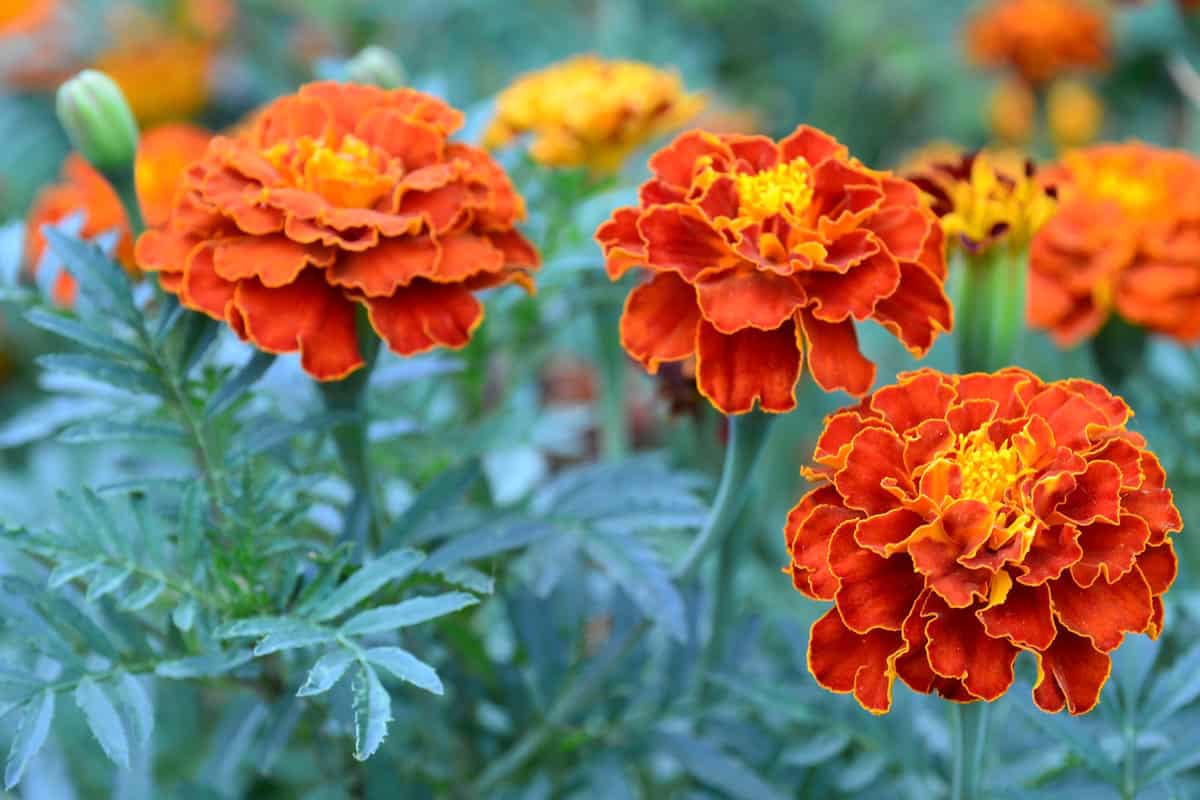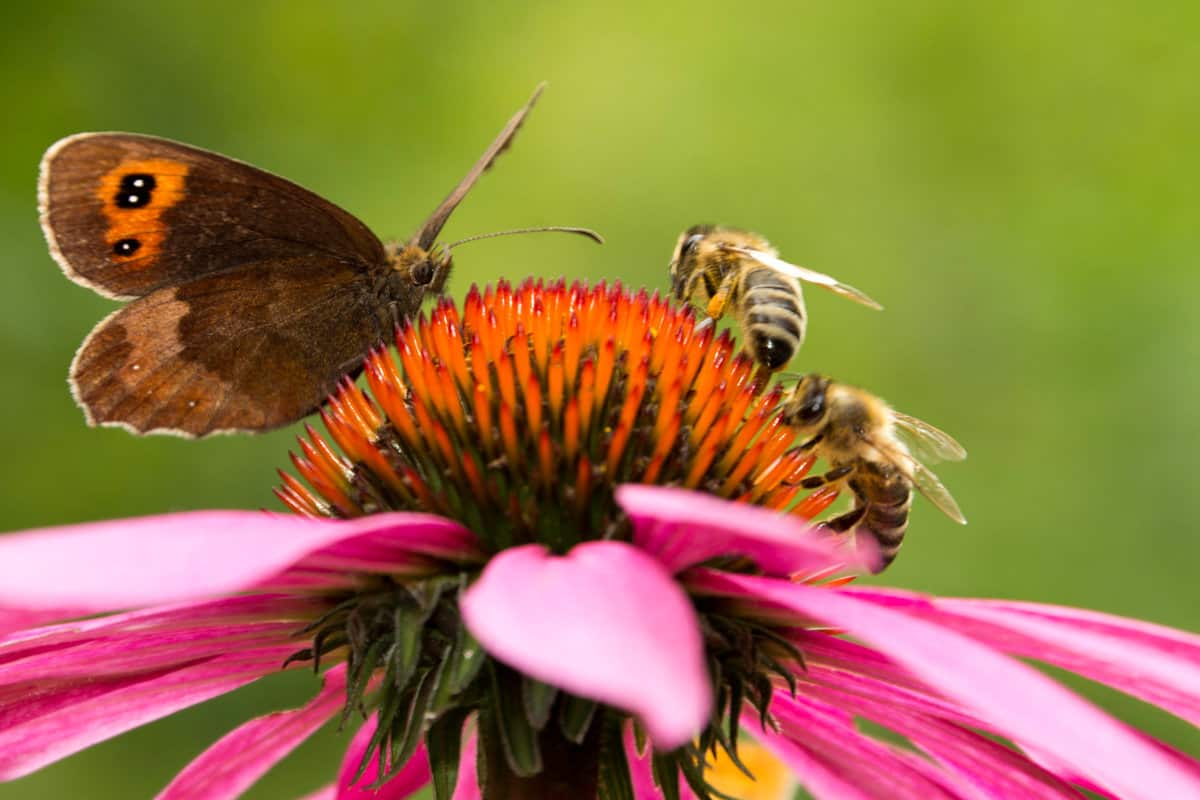Finding new plants to add to your garden can sometimes be stressful. Do you want to try growing marigolds but don't know whether they attract bees and butterflies? Would having these pollinators in your garden be better than not? We'll dive into these answers and more below!
Besides being gorgeous in your landscape, marigolds will also attract bees and butterflies to your garden. Marigolds are a favorite among honey bees and butterflies, often regarded as a 'pollinator buffet.'
Therefore, if you want to bring many into your property, try planting a few different types of marigolds. You also want to make them easily accessible, so butterflies and bees can reach them.
As we start this article, we will cover all things marigolds and discuss what they attract (and repel). Whether you're new to flower gardening or want to bring in pollinators, we're here to offer some guidance. With that said, let's dive right into this topic!
![CLSOE UP Butterfly on marigold - Do Marigolds Attract Bees & Butterflies [Yes! Tips For Planting In Your Yard]](https://gardentabs.com/wp-content/uploads/2022/10/CLSOE-UP-Butterfly-on-marigold-Do-Marigolds-Attract-Bees-Butterflies-Yes-Tips-For-Planting.png)
Does Planting Marigolds Bring Bees And Butterflies To A Garden?
Yes! Planting marigolds in your landscape is an easy way to attract bees and butterflies. Generally, marigolds work as an easy way to bring pollinators to your garden, ultimately giving your garden even more, color and life.
According to the pros at Costa Farms, marigolds are a 'pollinator buffet,' as they're highly popular among bees and butterflies. You can also expect more positive garden critters near your marigolds, like ladybugs.

Of course, we want to focus on the bee and butterfly species that your garden will soon welcome, but it's always good to know everything about a new flower.
Additionally, having marigolds in your yard can help attract and sustain a bee population. Considering that bees have been in danger for many years, creating your own safe space for them to live and reproduce is a great garden project.
So, marigolds seem to be a hit for pollinators alike.
Can Butterflies And Bees Share A Marigold?
Yes! Although you wouldn't think butterflies and bees would be friends, these species don't typically mind sharing a flower.
Since marigolds attract both bees and butterflies, it's expected to see them interacting with your plant simultaneously.
As we mentioned above, bees and butterflies are both pollinators. Therefore, they will pollinate your marigolds whenever the time is right, so it's normal to see them among each other in your garden.
Marigolds tend to have a fragrant scent, which can be attributed to why bees and butterflies like them so much.
African Marigold Flowers
These live marigold plants are an African variety, come in a pack of four, come in nursery pots, should bloom through the spring and summer, and can grow indoors or outside.
Follow this link to see them on Amazon.
Do Butterflies Pollinate Marigolds?
Yes, butterflies will pollinate a marigold. Specifically, the monarch butterfly usually pollinates garden marigolds, so keep an eye out for that species.
In general, fragrant, colorful flowering plants attract butterflies to a garden. The more pungent smell and brighter colors help the butterfly to your plants, ultimately inviting them to work their magic.
According to Butterflywebsite, Tagetes lemmonii (mountain marigold) is a perfect choice for creating your very own butterfly garden.
One of the reasons butterflies pollinate and enjoy being near marigolds is that they're a great nectar source. Butterflies need to eat too, so having plants filled with sweet nectar is always a good idea.
On top of that, marigolds tend to produce pollen-filled blooms, which is hard for a butterfly to resist!
Do Bees Pollinate Marigolds?
Yes! Although bees won't be as productive as butterflies when pollinating a marigold, they should still do this during the blooming season.
Generally, bees will be attracted to the nectar inside a marigold's blooms. While a bee feeds off your marigold, this will also be when they pollinate the plant.
Of course, marigolds often repel smaller critters with their musky scent, but bees don't mind it.
Like butterflies, this stronger smell can even call bees to your landscape, hence why marigolds are perfect for anyone wanting to conserve and protect the essential species in their gardens.
Marigolds work wonders for bringing good critters into your yard, so expect many more visitors if you plant a few. According to experts, you want to choose marigolds with "open centers," as these will be more favorable among bee species.
The easier you make it for a bee to come and drink from your flowers, the more they will pollinate.
Do Marigolds Attract Wasps?

Although your marigold will attract bees and butterflies, it should not do the same for wasps. Generally, wasps don't prefer the smell of marigolds, so this isn't a species they find particularly exciting.
French and American marigold varieties feature an almost spicy aroma, which can irritate many wasps. However, any marigold you plant will have a somewhat strong smell, so regardless, the wasps should steer clear.
On top of that, marigolds also won't attract yellow jackets, which can be dangerous for pets and children. So, having a few marigolds throughout your garden is a nice way to invite the good bugs in and keep the bad ones away.
What Other Bugs Do Marigolds Attract?
Besides attracting butterflies and bees, your marigolds also will bring in plenty of predatory insects. Although this sounds scary, having predatory bugs in your garden will keep pests away from your marigolds and plants nearby.
Specifically, marigolds attract ladybugs, lacewings, hoverflies, parasitic mini-wasps, and countless other predatory species that can help control aphids and other pests that can damage crops.
So, if you have vegetables or fruit in your garden, you may want to plant some marigolds around them.
However, marigolds can also attract larger insects into your landscape that will eat your flowers.
For example, it's common for grasshoppers, caterpillars, and Japanese beetles to munch on the leaves and flowers of your marigolds, so that can become an issue.
Of course, every plant will attract its own nuisances, so try to keep an eye on your flowers and take quick action to prevent serious issues.
Where Is The Best Place To Grow Marigolds?

For those wanting to grow marigolds, we recommend planting them somewhere with full sun, well-draining soil, and fertile conditions.
Marigolds love warm, moderate climates, so having them in the tropics or even the desert can suffice.
The key is having your flowers be in a spot where they can attract pollinators and absorb as many nutrients from the sun and ground as possible.
As mentioned above, you can try planting marigolds along a vegetable or fruit garden, as they make perfect barrier plants.
In addition, you might also want to use marigolds for garden edging or even grow them in large pots.
Regardless, you want your marigolds somewhere with good weather, plenty of sunlight, and enough room for them to mature and sprawl.
Will A Marigold Grow In Partial Shade?
Yes. Your marigold should still grow in partial shade if the ground is fertile and drains well. Usually, marigolds need between four and six hours of direct sunlight daily, so try and find a location where that's possible.
Furthermore, if your marigold is in the dappled shade, you don't want to overwater it. Plants without full sun tend to hold moisture longer, so adding water too frequently can lead to issues with your marigold's roots.
Another interesting fact about marigolds is that they don't mind drought. So, if your plants are in a shadier location and you choose to cut back their water, this won't likely affect them.
Again, don't starve your plants, but marigolds shouldn't suffer adverse effects if you want to cut back on watering and avoid root rot and waterlogging.
How Often Should I Water My Marigolds?
You generally want to give marigolds a watering once per week. However, this will be slightly different depending on the weather and soil conditions.
As we said, marigolds can handle periods of drought, but that doesn't mean you should ignore them entirely. Instead, feel the top inch of soil before you want to water.
If it feels dry, then it's time for more moisture.
If not, we recommend waiting a few days or until the soil feels dry to the touch. One of the leading killers of marigolds is overwatering.
Therefore, watering one too often can be deadly, regardless of where you live. Doing this 1-2 times weekly should be perfect for your plant, so aim for that timeline in your garden.
Do Butterflies And Bees Like The Same Flowers?

Yes, bees and butterflies will typically like the same flowers. However, bees tend to focus more on open-center flowers, which shelter them while they eat and pollinate.
On the other hand, butterflies prefer flat flowers as they can stand and do their thing. When comparing pollinators, hummingbirds and bees tend to have more similar tastes in flowers than butterflies and bees.
Again, that doesn't mean your garden can't have both. As we said before, bees and butterflies live harmoniously and can share plants without issue.
To Wrap Up
Whether you have marigolds growing in your landscape or want to plant a few, it's always nice to know what they attract. We found that marigolds will bring butterflies and bees to your garden and countless others critters.
Marigolds have a strong smell, which is attractive to butterflies and bees. Furthermore, these insects will pollinate your marigolds during the spring and summer, which is a win-win for you and them.
We recommend planting marigolds near vegetable and fruit gardens, as they'll protect your crops from harmful pests and welcome bees, butterflies, and good bugs into your garden.
Made it to the end? Check out these other helpful garden articles below!
Should I Deadhead Marigolds? [Which Marigolds Do Not Need Deadheading]?

